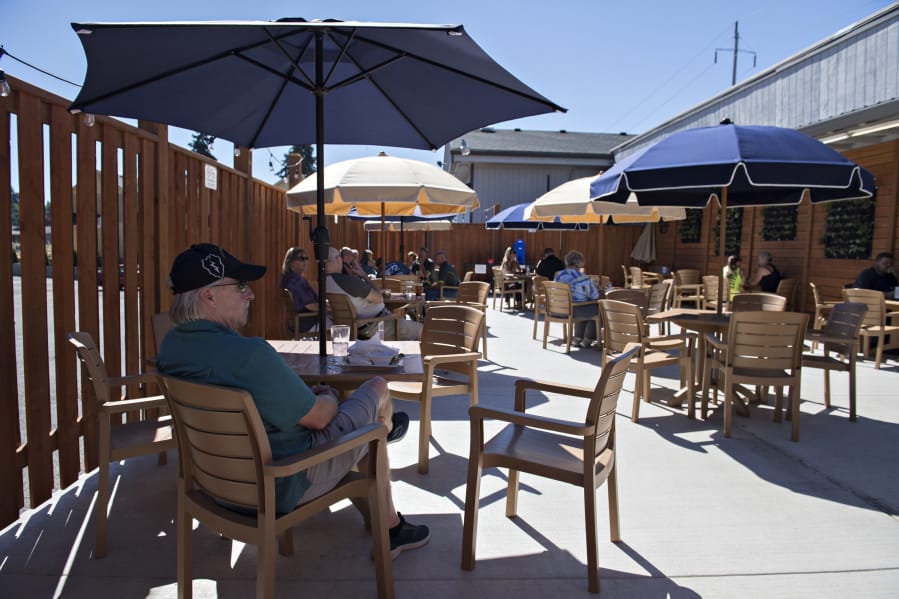La Bottega converted its indoor space into a grocery store. The Mighty Bowl started a plant-based burger-and-beer dinner service on the weekend. Tommy O’s at the Camas Hotel opened a walk-up window.
Yet as some Clark County restaurants turn to creative ways to generate revenue during the pandemic, a wave of restaurant closures looms as Phase 2 restrictions linger.
Owners are able to earn more money from outdoor seating, but with colder, wetter weather approaching, they fear that their businesses will decline. On top of that, Paycheck Protection Program loan money is running out, which cuts off funding for their payroll.
“The whole idea is we’re having to adapt,” said Steve Valenta, owner of The Mighty Bowl. “We can’t sit back idly and watch us decline.”
Valenta’s new burger service, branded as Moo, occupies the same space as The Mighty Bowl. Moo offers vegan burgers made with Impossible-brand patties. It’s the first vegan restaurant in Vancouver, Valenta said. Before the pandemic, The Mighty Bowl offered its bowls for dinner, but they didn’t sell as well as at lunch.
Pivoting the space to serve burgers and beer is Valenta’s way to adapt.
“I think Vancouver is ready for an all plant-based restaurant,” he said.
Including the Mighty Bowl’s outdoor “parklet” seating area, about 32 people can eat at the location. Most Vancouver restaurants have added outdoor seating as part of the city’s Street Eats program, which allows restaurants to set up tables on sidewalks and parking spots.
“Anyone who has the ability to have seating outside gets an advantage with the rules,” said Beaches owner Mark Matthias, who moved about 37 tables to his parking lot.
“Unfortunately, there’s restaurants that don’t have that ability,” he said. “We’re one of the lucky ones.”
The Street Eats program expires Sept. 30, but the city is in talks about extending the program, said Teresa Brum, the city’s community and economic development manager.
Once the colder, wetter weather rolls in, outdoor seating is going to be less appealing to diners — raising a major concern for restaurant owners.
“It’s not a shock that things are looking bleak heading to the fall and winter,” said Mychal Dynes, co-owner of Little Conejo.
Deb Belden, owner of Farrar’s Bistro in Felida, said her restaurant’s outdoor seating is a big factor in her business staying alive.
“It’s working very well because we’ve had the most beautiful weather,” she said. “Looking to the future, we are a little apprehensive.”
Belden already bought an outdoor heater and is looking to buy a tent that would seat about 20 people.
She’s trying anything she can do to make additional revenue: starting a lunch service that helps parents feed their kids during at-home school time, considering wholesaling her food, and offering grab-and-grill packages for at-home cooking.
“Restaurants as we knew them are no more,” she said. “It’s not a laughing, fun environment as it once used to be. Whatever we can do, we’re doing.”
La Bottega in Vancouver converted its dining room into a grocery-store style space. Before the pandemic, the restaurant sold olive oil and coffee, but now there’s about five times as many items for sale. That includes produce such as eggplant and tomatoes, said Jaden Yordi, manager at La Bottega.
“It’s helping a lot,” he said.
The owners may add more coolers and freezers to expand the number of items for sale, Yordi said.
La Bottega has eight outdoor tables, but once the rain starts, some of the tables will be moved back inside, he said.
Urging fewer restrictions
Matthias said he and a group of local restaurant owners are calling on the state to ease the restrictions on restaurants. The group meets virtually every Thursday to float ideas and discuss ways to keep their businesses alive.
“We’re trying as a group to send reasonable proposals to the governor and local officials on what’s a reasonable approach to allow more flexibility in the coming month,” he said.
The current rules for restaurants only allow 50 percent seating capacity inside and a 6-foot gap between tables. No more than five can dine at a single table, and even then they must all be living in the same household.
Matthias’ letter recommended allowing parties of six.
“At least allow three couples to dine together,” he wrote in the letter.
He also urged the same-household rule to be cut.
“This is impossible to manage and has simply created an environment of deception,” he wrote. “Many operations do not have a reasonable patio option, and if it rains, it literally kills every restaurant. A high percentage of our business is not the same household, so by this fall when the weather changes, it’s over for everybody,” he wrote.
Belden said she feels that the restrictions to stop the COVID-19 spread have targeted restaurants.
“If any place is safe, it’s a restaurant,” she said. “We were already under mandate of the health department before the pandemic.”
Belden said that Farrar’s, like many other restaurants, has a designated person sanitizing spaces that include door handles and restrooms.
“People should not be worried about dining out in restaurants,” she said.
Bryan Shull, owner of Trap Door Brewing, said that the hospitality industry is “in crisis mode” going into the winter because of the 50 percent capacity and the 6-foot distance rule. He also said that Gov. Jay Inslee’s rule that removed breweries, wineries and distilleries without a food menu from the restaurant category caused those businesses to lose revenue. Last week, breweries were able to serve prepackaged food to categorize them as restaurants, which Shull said helped them adapt — but it’s not enough.
“If we do not have some common sense changes made immediately, I predict 50 percent closures within six months, with the downstream ripple effect crippling supporting industries,” he said.
PPP loans
Some restaurateurs are watching Congress to see if they’ll get a second round of PPP loan forgiveness stimulus money. Without it, more restaurants in the county will permanently close, adding to a list that ranges from local places like Lappellah and Low Bar to chain eateries like Sweet Tomatoes and Joe’s Crab Shack.
“Everybody is burning through the PPP money,” Valenta said. “When the money runs out, the game is over. We’re operating at 40 to 50 percent of revenue. It’s not survivable.”
Belden said she’s already spent her PPP money.
“It’s amazing how fast that money goes,” she said. “I still have a healthy team of employees.”
On Aug. 8, the federal government stopped accepting loan applications, but another round is under discussion in Congress. Lawmakers are not expecting to make any progress on the new stimulus money until after Labor Day.
The program offered 5.2 million forgivable loans for a total of $525 billion to businesses in the U.S., and it ended with $134 billion left. As of July 6, more than 6,400 businesses had received a loan, but it’s unclear how many of them were restaurants.
“Those loans were a great tool,” Matthias said “They had really good intentions.” It will take more loans and fewer restrictions for many operators to survive.
“People are going to need both,” he said.




